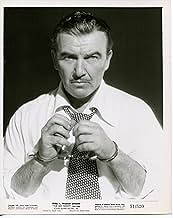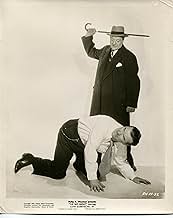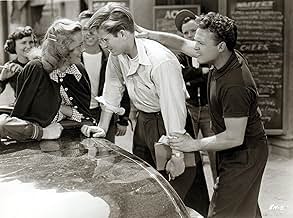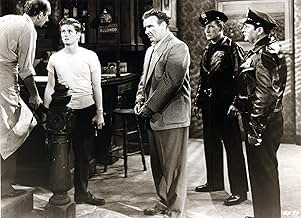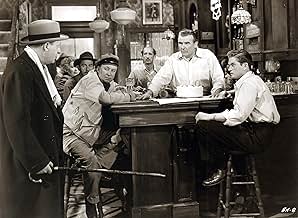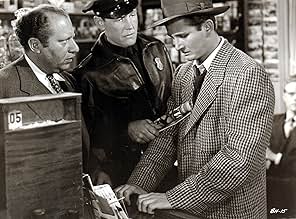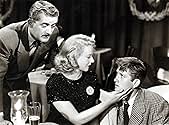IMDb RATING
6.3/10
1.3K
YOUR RATING
A teenager comes of age while seeking revenge on the man who beat up his father.A teenager comes of age while seeking revenge on the man who beat up his father.A teenager comes of age while seeking revenge on the man who beat up his father.
John Drew Barrymore
- George La Main
- (as John Barrymore Jr.)
Howland Chamberlain
- Flanagan
- (as Howland Chamberlin)
Emile Meyer
- Peckinpaugh
- (as Emil Meyer)
Mauri Leighton
- Terry Angelus
- (as Mauri Lynn)
Robert Aldrich
- Ringsider at Fight
- (uncredited)
Walter Bacon
- Boxing Match Spectator
- (uncredited)
Benjie Bancroft
- Bar Patron
- (uncredited)
Robert Bice
- Taxi Driver
- (uncredited)
Willie Bloom
- Boxing Match Spectator
- (uncredited)
Chet Brandenburg
- Boxing Match Spectator
- (uncredited)
Lane Chandler
- Printer
- (uncredited)
Edmund Cobb
- Cop
- (uncredited)
Featured reviews
A truly cop out ending really ruins what was potentially a great coming of age
film. John Drew Barrymore gave an outstanding performance as our youth
protagonist who does a lot of growing up in The Big Night.
Young Barrymore celebrating his 17th birthday is horrified that at his birthday party sportswriter Howard St.John gives Barrymore's father Preston Foster one severe and public thrashing. And Foster who back in his prime Hollywood days in the 30s was one rugged tough guy just submits to it. A case of directolr Joseph Losey casting successfully against type. i do wish we saw a bit more of Foster in the film though.
Looking to avenge the family honor Barrymore has quite an odyssey on his Big Night.
I can't say more lest I spoil things, but the ending was a cop out. My guess was that the soon to be blacklisted Joe Losey made some concession to Hollywood convention. It was not over politics though.
Not the best note Losey could have left America on.
Young Barrymore celebrating his 17th birthday is horrified that at his birthday party sportswriter Howard St.John gives Barrymore's father Preston Foster one severe and public thrashing. And Foster who back in his prime Hollywood days in the 30s was one rugged tough guy just submits to it. A case of directolr Joseph Losey casting successfully against type. i do wish we saw a bit more of Foster in the film though.
Looking to avenge the family honor Barrymore has quite an odyssey on his Big Night.
I can't say more lest I spoil things, but the ending was a cop out. My guess was that the soon to be blacklisted Joe Losey made some concession to Hollywood convention. It was not over politics though.
Not the best note Losey could have left America on.
Joseph Losey's The Big Night is a film noir that's also, like Moonrise and Talk About A Stranger, a coming-of-age story. The young male undergoing his transformational journey is John Barrymore, Jr., son of the Great Profile and father of Drew. His film career was not high-profile, as he inherited the family disposition toward chemical dependency (blood will tell). But here, boasting a luxuriantly healthy crown of hair, he gives a surprisingly intense yet controlled performance. His big night happens to be his 16th or 17th birthday, when his barkeep father is brutally beaten and publicly humiliated by a local sportswriter (Losey's staging is unflinching). Frustrations about his own Hamlet-like ditherings and confusions impel him to seek revenge on his father's behalf, and, gun in pocket, he sets out into a nightscape of prize fights, gin mills and the walk-up flats of casually met strangers. While Losey's sympathies lie with Barrymore, it's always clear that the emergent man is still a callow stripling, incapable of apprehending the complex reality he crashes into, like a fatted calf in a china shop. Though the director refrains from pushing the conclusion to where it might logically go -- he retreats into sentimentality and sententiousness -- The Big Night still scores as a provocative, moodily shot film.
Joseph Losey on his nightmare years on Hollywood accused of anti-American activities that famous black list, here made a small Noir picture starring the younger Barrymore's clan John Barrymore Jr, playing a teenager who testified his beloved father Andy La Main (Preston Foster) get beat up upon eyes of many customers without any defensive posture, it pulls out entrains of soul, seek revenge through the night against a notorious sportswriter Al Judge (Howard St. John) wherever he goes all night long, firstly on a box match where he bumps into a friendly guy Dr. Lloyd Cooper (Philip Bourneuf) who'll buy an extra ticket, stolen by a corrupt cop aftermaths, he is introduces for a Dr. Lloyd's lover Marion (Joan Loring) at night club, meanwhile looking around Al Judge's whereabouts.
The young George La Main stalking Al Judge in every place, this journey actually is his prove of fire, due in that night George will see how the anger sometimes is silly over a so complex matter regarding his father's past happenings, he'll meets a gorgeous black singer girl, where the society barrier split apart, also on Marion's apartment he randomly faces a young girl whom cares about him, depressing and haunted George seeks Al Judge at your own apartment aiming for clear up and finally got his so awaited revenge, however the real reason will baffled him when the perpetrator claiming a fair reason.
Aside the fine premise the outcome is faraway to be suitable, a lame screenplay lost a fair opportunity to allowed a convincing ending, what a waste, in other hand there are plenty of fine sequences at long night in several places, as the fabulous one at toilet, also on the box match when George watching Al Judge thru binocs one second later Al disappears from the sight, fantastic sequences worthwhile a look in this early Losey.
Thanks for reading
Resume:
First watch: 2023 / How many: 1 / Source: DVD / Rating: 7.
The young George La Main stalking Al Judge in every place, this journey actually is his prove of fire, due in that night George will see how the anger sometimes is silly over a so complex matter regarding his father's past happenings, he'll meets a gorgeous black singer girl, where the society barrier split apart, also on Marion's apartment he randomly faces a young girl whom cares about him, depressing and haunted George seeks Al Judge at your own apartment aiming for clear up and finally got his so awaited revenge, however the real reason will baffled him when the perpetrator claiming a fair reason.
Aside the fine premise the outcome is faraway to be suitable, a lame screenplay lost a fair opportunity to allowed a convincing ending, what a waste, in other hand there are plenty of fine sequences at long night in several places, as the fabulous one at toilet, also on the box match when George watching Al Judge thru binocs one second later Al disappears from the sight, fantastic sequences worthwhile a look in this early Losey.
Thanks for reading
Resume:
First watch: 2023 / How many: 1 / Source: DVD / Rating: 7.
As someone who knew John Barrymore Jr. 25 years ago, I was heartbroken to see him early in his aborted film career. Though not as charismatic as James Dean would be just a couple of years later, he was certainly Dean's prototype in The Big Night. Perhaps with a better film and a less disturbed personality, Barrymore might have been a working Hollywood actor for many years to come. Anyway, what director Joseph Losey lacked here was the Los Angeles cityscape he used to full effect that same year in his retelling of Fritz Lang's M. The Big Night was screaming for a location project on downtown L.A.'s seedy, beaten down Bunker Hill, a neighborhood of crumbling Victorian mansions and apartment buildings with vertiginous stairways that provided so much atmosphere to other films, such as Kiss Me Deadly, Criss-Cross, The Exiles and, yes, M. Instead, the movie is stage bound and hemmed in by sets that never look convincing. With its rambling "a night in the life" plot line, The Big Night needed another character: a dark city of real streets, background lights, rambling old house, and dingy clubs and bars. In other words, the kind of verisimilitude that transports the viewer into the protagonist's world. The back lot, unfortunately, was a poor stand-in.
From Losey's American feature films (a period which barely lasted four years, when he fell victim to political persecution) I had only previously watched his eccentric debut, THE BOY WITH GREEN HAIR (1948). The same year he made THE BIG NIGHT, a low-budget noir, he directed two other thrillers - THE PROWLER, Losey's own favorite from this early phase of his career and M, an Americanization of Fritz Lang's German masterpiece. Both these films promise to be a good deal more interesting than the ones I watched, and I hope I get the chance to view them someday...
Anyway, back to THE BIG NIGHT: in itself, it wasn't too bad but it didn't feel at all like a Losey film; perhaps that's because I'm not used to watching him dealing with an American setting - but it's still a minor film, not quite knowing where it's going and not even that compelling while it's on. The noir-ish atmosphere (courtesy of cinematographer Hal Mohr), however, is quite interestingly deployed - sometimes with an audacious psychological resonance, as in the nightclub scene where a riotous drum solo brings back to lead John Barrymore Jr. (looking more like Sean Penn than his matinée' idol father!) memories of his father's vicious beating at the hands of a crippled but influential sports columnist (an effectively sinister Howard St. John); the latter episode is actually a key scene, which sets the plot in motion and sends Barrymore - who witnessed father Preston Foster's humiliation and whom he idolized - seething with revenge in search of St. John.
The characters are largely stereotypes - caring bartender (Foster owns a bar), philosophical drunk pal, his bitter girlfriend (a rather spent Dorothy Comingore, who 10 years earlier had played Susan Alexander in CITIZEN KANE [1941]!), her good-girl sister who falls for and yearns to 'save' Barrymore, shady promoter Emil Meyer (a dry run for his memorable turn as a crooked cop in SWEET SMELL OF SUCCESS [1957]), etc. - but the last act provides a couple of ironic twists involving the characters of Foster, St. John and the tragic fate of a woman they both loved in their own way.
Anyway, back to THE BIG NIGHT: in itself, it wasn't too bad but it didn't feel at all like a Losey film; perhaps that's because I'm not used to watching him dealing with an American setting - but it's still a minor film, not quite knowing where it's going and not even that compelling while it's on. The noir-ish atmosphere (courtesy of cinematographer Hal Mohr), however, is quite interestingly deployed - sometimes with an audacious psychological resonance, as in the nightclub scene where a riotous drum solo brings back to lead John Barrymore Jr. (looking more like Sean Penn than his matinée' idol father!) memories of his father's vicious beating at the hands of a crippled but influential sports columnist (an effectively sinister Howard St. John); the latter episode is actually a key scene, which sets the plot in motion and sends Barrymore - who witnessed father Preston Foster's humiliation and whom he idolized - seething with revenge in search of St. John.
The characters are largely stereotypes - caring bartender (Foster owns a bar), philosophical drunk pal, his bitter girlfriend (a rather spent Dorothy Comingore, who 10 years earlier had played Susan Alexander in CITIZEN KANE [1941]!), her good-girl sister who falls for and yearns to 'save' Barrymore, shady promoter Emil Meyer (a dry run for his memorable turn as a crooked cop in SWEET SMELL OF SUCCESS [1957]), etc. - but the last act provides a couple of ironic twists involving the characters of Foster, St. John and the tragic fate of a woman they both loved in their own way.
Did you know
- TriviaAccording to interviews that director Joseph Losey gave in the mid-1970s to Michel Ciment, the FBI wanted to spy on him in Europe, where he relocated to work after being blacklisted by Hollywood because of his political activities. So they paid John Drew Barrymore (who became a good friend after this movie) to furnish information about Losey's political activities, if any, in London. Barrymore later met Losey in London and confessed to him about the money and expense account the FBI had given him to spy on Losey. Losey, recalling that the young actor had been under tremendous pressure at the time, forgave him and, in fact, suggested that they have several lavish meals together and put the cost on Barrymore's FBI expense account, which they promptly did.
- GoofsThe magazine racks outside the corner store are mostly issues contemporary to 1951, with one glaring exception. A copy of the famous first issue of The New Yorker (published in 1925).
- Quotes
Peckinpaugh: Next time you see somebody drop money, don't think about it so long before you decide to give it back.
- ConnectionsFeatured in Vampira Returns: The Big Night 1951 (1956)
- How long is The Big Night?Powered by Alexa
Details
- Release date
- Country of origin
- Language
- Also known as
- Die Nacht der Wahrheit
- Filming locations
- 218 East 12th Street, Downtown, Los Angeles, California, USA(George goes to the old St. Joseph's Church - destroyed by fire and demolished in 1983)
- Production company
- See more company credits at IMDbPro
- Runtime
- 1h 15m(75 min)
- Color
- Aspect ratio
- 1.37 : 1
Contribute to this page
Suggest an edit or add missing content



